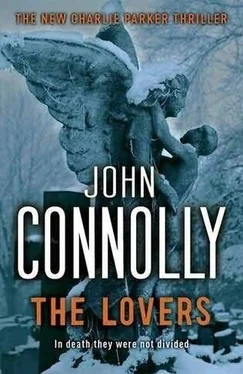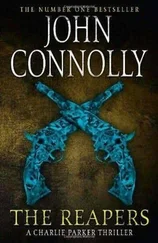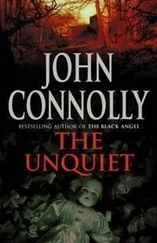John Connolly - The Lovers
Здесь есть возможность читать онлайн «John Connolly - The Lovers» весь текст электронной книги совершенно бесплатно (целиком полную версию без сокращений). В некоторых случаях можно слушать аудио, скачать через торрент в формате fb2 и присутствует краткое содержание. Жанр: Триллер, на английском языке. Описание произведения, (предисловие) а так же отзывы посетителей доступны на портале библиотеки ЛибКат.
- Название:The Lovers
- Автор:
- Жанр:
- Год:неизвестен
- ISBN:нет данных
- Рейтинг книги:4 / 5. Голосов: 1
-
Избранное:Добавить в избранное
- Отзывы:
-
Ваша оценка:
- 80
- 1
- 2
- 3
- 4
- 5
The Lovers: краткое содержание, описание и аннотация
Предлагаем к чтению аннотацию, описание, краткое содержание или предисловие (зависит от того, что написал сам автор книги «The Lovers»). Если вы не нашли необходимую информацию о книге — напишите в комментариях, мы постараемся отыскать её.
The Lovers — читать онлайн бесплатно полную книгу (весь текст) целиком
Ниже представлен текст книги, разбитый по страницам. Система сохранения места последней прочитанной страницы, позволяет с удобством читать онлайн бесплатно книгу «The Lovers», без необходимости каждый раз заново искать на чём Вы остановились. Поставьте закладку, и сможете в любой момент перейти на страницу, на которой закончили чтение.
Интервал:
Закладка:
He didn’t say anything when he saw me. He just opened the door, nodded once, then turned around and led the way to the kitchen. I closed the door behind me and followed him. A pair of candles burned in the kitchen, one on the windowsill and a second on the table. Beside the second candle stood a bottle of good-maybe very good-red wine, a decanter, and two glasses. Jimmy tenderly touched the neck of the bottle, stroking it as though it were a beloved pet.
“I’ve been waiting for an excuse to open it,” he said. “But these days, I don’t seem to have too many causes for J `Ø[1] `end celebration. Mostly, I go to funerals. You get to my age, that’s what you do. I’ve been to three funerals already this year. They were all cops, and they all died of cancer.” He sighed. “I don’t want to go that way.”
“Eddie Grace is dying of cancer.”
“I heard. I thought about going to see him, but Eddie and me-” He shook his head. “All we had in common was your old man. When he went, Eddie and me had no reason to talk.”
I recalled what Eddie had said to me before I left him, about how Jimmy Gallagher had spent his life living a lie. Maybe Eddie had been referring, however obliquely, to Jimmy’s homosexuality, but I knew now that there were other lies to be uncovered, even if they were lies of omission. Still, it wasn’t for Eddie Grace to judge how any man lived his life, not in the way that he had judged Jimmy. We all presented one face to the world, and kept another hidden. Nobody could survive in it otherwise. As Jimmy unburdened himself, and my father’s secrets were slowly revealed to me, I came to understand how Will Parker had buckled under the weight of them, and I felt only sadness for him and for the woman he had betrayed.
Jimmy took a waiter’s friend from a drawer and carefully cut the foil on the bottle before inserting the tip of the corkscrew into the cork. It took only two twists, and then a single pull, for the cork to release with a satisfying, airy pop. He looked at it to make sure that it wasn’t dry or decaying, and cast it to the side.
“I used to sniff the corks,” he said, “but then someone pointed out that it tells you nothing about the quality of the wine. Shame. I liked the ritual of it, until I found out that it made me look like a know-nothing.”
He positioned the candle behind the bottle as he decanted it, so that he could see the sediment approaching the neck.
“No need to let it stand for long,” he said, once he was finished. “That’s just with younger wines. It softens the tannins.”
He poured two glasses, and sat. He held his glass to the candlelight to examine it, lifted it to his nose, sniffed, then swirled the wine around before sniffing again, holding the bowl in his hands to warm it. Finally, he tasted it, moving the wine around in his mouth, savoring the flavors.
“Fantastic,” he said, then raised his glass in a toast. “To your old man.”
“To my old man,” I echoed. I sipped the wine. It tasted rich and earthy.
“Domaine de la Romanée-Conti, ninety-five,” said Jimmy. “A pretty good year for burgundy. That’s a six-hundred-dollar bottle of wine we’re drinking.”
“What are we celebrating?”
“The end.”
“Of what?”
“Of secrets and lies.”
I put my glass down. “So where do you want to begin?”
“With the dead baby,” he said. “With the first dead baby.”
Neither of them ha R ar of themd wanted to work the twelve-to-eight that week, but that was the way the cookie had crumbled, them was the breaks, or whatever other cliché one might have decided to apply to a situation when there was only one end of the stick to grasp, and it wasn’t the fragrant end. That evening, the precinct was holding a party at the Ukrainian National Home over on Second Avenue, which always smelled of borscht and pierogi and barley soup from the restaurant on the first floor, and where the director Sidney Lumet would rehearse his movies before beginning filming, so that, over time, Paul Newman and Katharine Hepburn, Al Pacino and Marlon Brando would all walk up and down the same steps as the cops of the Ninth. The party was to celebrate the fact that three of its officers had been awarded combat crosses that month, the name given to the green bars received by those who had been involved in a shoot-out. The Ninth was already the Wild West back then: cops were dying. If it came down to you and the other guy, you shot first and worried about the paperwork later.
New York then wasn’t like it was now. In the summer of ’64, the racial tensions in the city had come to a head with the killing of fifteen-year-old James Powell in Harlem by an off-duty patrolman. What started out as orderly protests against the killing turned into riots on July 18, when a crowd gathered at the One-Two-Three in Harlem shouting, “Murderers!” at the cops inside. Jimmy and Will had been sent up as part of the reinforcements, bottles and bricks and garbage-can lids raining down on them, looters helping themselves to food and radios and even weapons from the neighborhood stores. Jimmy could still recall a police captain pleading with the rioters to go home, and hearing someone laugh and call back: “We are home, white boy!”
After five days of rioting in Harlem and Bed-Stuy, one person was dead, 520 had been arrested, and the writing was on the wall for Mayor Wagner. His days had already been numbered, even before the riots. The annual murder rate had doubled to six hundred a year under his administration, and even before the Powell shooting, the city had been reeling from the murder of a woman named Kitty Genovese in her middle-class Queens neighborhood, who was stabbed in the course of three separate assaults by the same man, Winston Moseley, twelve people either witnessing or hearing the murder while it was in progress, most of them declining to intervene in any way beyond calling the cops. It was felt that the city was coming apart, and Wagner bore the brunt of the blame.
None of these concerns about the state of the city came as news to the men of the Ninth. The Ninth was affectionately known as “the Shithouse,” by those who served there, less so by everyone else. They were a law unto themselves, the men of that precinct, and they guarded their territory well, keeping an eye out not only for the bad guys but for some of the good guys too, like captains looking to kick ass on a slow day. “Fly in the Shithouse,” someone would call in over the radio, and then everyone would stand a little straighter for as long as was necessary.
Jimmy and Will were ambitious back then, both looking to make sergeant as soon as possible. The competition was tougher than before, since Felicia Spritzer’s lawsuit in 1963 that resulted in female officers being allowed to take promotional examinations for the first time, with Spritzer and Gertrude Schimmel making sergeant the following year. Not that Jimmy and Will gave a rat’s ass, unlike some of the older guys who had a lot of views on where a woman’s place was, none of which included wearing three stripes in one of their precincts. They both had a copy of the R a copy of patrol guide, thick as a Bible in its blue-plastic ring binder, and they carried the guide with them whenever they took a break so that they could test each other’s knowledge. In those days, you had to do detective work as a patrol officer for five years before you could make detective, but you wouldn’t start bringing in a sergeant’s money until you made second grade. They didn’t want to be investigators anyway. They were street cops. So they decided that they’d both try for the sergeant’s exam, even if it meant that they’d have to leave the Ninth, maybe even have to serve in different precincts. It would be tough, but they knew that their friendship would survive it.
Читать дальшеИнтервал:
Закладка:
Похожие книги на «The Lovers»
Представляем Вашему вниманию похожие книги на «The Lovers» списком для выбора. Мы отобрали схожую по названию и смыслу литературу в надежде предоставить читателям больше вариантов отыскать новые, интересные, ещё непрочитанные произведения.
Обсуждение, отзывы о книге «The Lovers» и просто собственные мнения читателей. Оставьте ваши комментарии, напишите, что Вы думаете о произведении, его смысле или главных героях. Укажите что конкретно понравилось, а что нет, и почему Вы так считаете.












